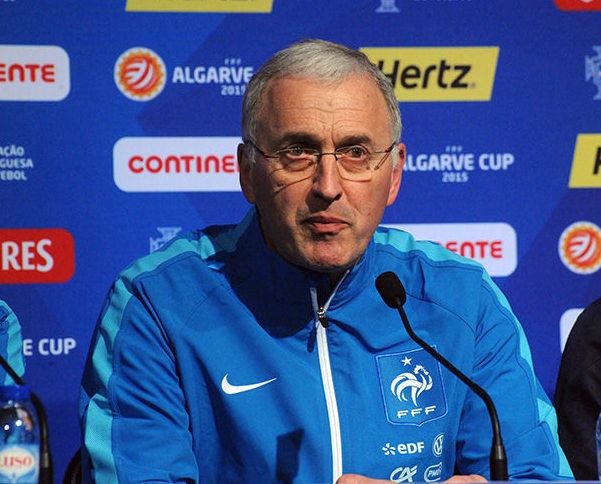The other day on Facebook my friend and Dear Dear Sports Fan Fan, Natty, asked me about the backgrounds of coaches in this year’s Women’s World Cup. I had no idea! So, I decided to do some research. Over the next few days, as the teams all play their second games in the Group Stage, we’ll be profiling their coaches. We’ve covered Group A, Group B, Group C,, Group D, and Group E so far, here’s Group F.
Colombia – Fabián Taborda
The 36 year-old Fabián Taborda is billed as a “former PE teacher” but that probably does him a bit of a disservice. There aren’t many gym teachers who have coached their country’s Under-17 women’s national team to a U-17 World Cup or, when promoted to coach the senior level team, could implement a defensive strategy to stop the Brazilian attack and qualify for the World Cup with an unbeaten record.
England – Mark Sampson
The 32 year-old Mark Sampson has had a meteoric and non-traditional rise through the ranks of coaching to become head coach of the English national soccer team. The Wales native jokes that although he figured out he wouldn’t have a future in soccer as a player, his father says he could have told him at age six. Instead, he focused on becoming a coach, even as he was still playing as a semi-pro himself. He found a back-office job with the English Premier League team, Swansea City. Instead of continuing to work his way up within that organization, he took a job as head coach of Bristol Academy, a rare women’s professional soccer team that’s unaffiliated to any of the Premier League teams. Despite the financial disadvantage of this setup, Sampson and his team were so successful, that when the senior national team job came open, Sampson was given a shot.
France – Philippe Bergeroo
Philippe Bergeroo has been to World Cups before: as a backup goalie on France’s 1986 World Cup team and as a goalie coach for the 1998 France men’s team that won the World Cup. As a head coach, he’s been successful on the international level but a disaster as a professional coach. In two stints with top-level French men’s club teams, he’s flamed out and been fired twice. Not that being fired is a disgrace, it’s by far the most common outcome for all coaches, but these were both in-season firings after extended slumps. On the international level, he once led the Under-17 French men’s national team to a European championship. He had never coached women before 2013 when he was approached by the French soccer federation to take the job. He inherited a good team and has made them better. Bergeroo isn’t just focused on raising the fitness level of his team, he’s also thinking about the 2019 World Cup which will be in France and the impact that will have on all levels of women’s soccer in the country. Meanwhile, this French team went undefeated in World Cup qualification and are expected to compete for the championship.
Mexico – Leonardo Cuéllar
Like his French counter-part, Leonardo Cuéllar has World Cup experience as a player. Unlike Bergeroo, Cuéllar actually saw the field, starting all three games in the 1978 World Cup for Mexico. Cuéllar played much of his club soccer in the United States, playing in the NASL in both its outdoor and indoor phases. He was still living and coaching in the United States in 1998 when the Mexican soccer federation sold him on the idea of becoming head coach of the women’s program. During his long tenure as coach, Mexican women’s soccer has grown and improved massively. Long a punching bag for the United States team, Mexico finally broke through and won a game in 2010. Cuéllar has helped women’s soccer grow as a serious sport in Mexico and his team trains in the same facilities as the men’s national team. Although he’s coached in the 1999 and 2011 World Cups, the 61 year-old Cuéllar and Mexico are still looking for their first ever World Cup win.

